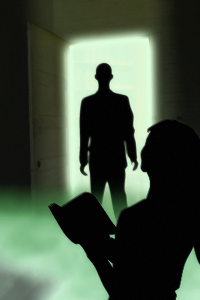An essay by Euphemia Thorniwork, as provided by Judith Field
Art by Scarlett O’Hairdye
November, 1890
A splash of water in my face brought me round. I opened my eyes and sat up to find myself in the lecture theatre of Huxley College, Oxford, where a mathematics lecture was in progress. Spaulding, my fellow student, knelt at my side with knitted brows, an empty glass in his hand.
“Are you alright, Euphemia?” he whispered. “You fainted and slid from your seat to the floor. I took it upon myself to apply first aid. Do you require more water?”
“No!” I dragged myself back into my seat and pulled my handkerchief out of my cuff to dry my face. “No, thank you. I am quite myself.”
Spaulding took his place and looked toward the blackboard at the front of the hall. There were mutterings from several parts of the audience about feeble women who were simply not up to the job. Dr Wagstaff continued his lecture as though he had not noticed my faint.
The dim lamps in the hall matched the gloom I felt. I groaned inwardly, cursing myself for swooning like a character from a melodrama. Shifting in my seat, I was unable to get comfortable or concentrate. I jumped as Dr Wagstaff banged the chalk down onto the table in front of him to make a point I had not heard. The chalk shattered into a cloud of dust, which settled on his whiskers, changing them from grey, to white.
The letter from my mother was the cause of my loss of consciousness. It arrived just as I was leaving for College, and I made the mistake of opening it during the lecture. She told me that Barings were virtually insolvent following imprudent investments in the Argentine. I had lost most of my legacy from Uncle Eric. There was enough to last until the end of this term. Four weeks, and then my time as the first female student of mathematics at Huxley College would be at an end. I began to feel dizzy again and rummaged in my Gladstone bag for smelling salts but found none.
I pushed the letter inside the bag, next to one Mother had sent me earlier in the week, informing me that Mr. Driver who owned the pharmacy had been enquiring after me again. She considered that he would ask me to walk out with him next time I was at home. My stomach turned at the thought of keeping company with sweaty-faced Thomas Driver and his hot breath that smelled of fish. But unless I could fund my continuing academic career, penury would force me to do so, with him or someone like him. If I were a man, I could find gainful employment. But for me, it was a choice between Driver, or scratching an existence as a spinster, invisible without a man by my side.
I had to find a source of income. I poked and prodded inside the bag again, but other than my keys and the two letters from Mother, all it contained was the classified advertisement I had torn out of the newspaper:
Wanted immediately at the home of a gentleman scholar a prudent, steady and careful assistant without dependents for novel physics research project of vital importance and of the utmost confidentiality. Each evening, all day Saturday and Sunday. Must be accustomed to the maintenance of glass instruments and equipment and to working with the electrophorus and the dry cell. Good character indispensible. Ability to hold breath for at least one minute a distinct advantage. Five shillings per week offered. Apply to Dr Q Wagstaff at the office of this paper.
I had not been surprised to see it, for the college was rife with rumours about Dr Wagstaff. It was said that he had already had three assistants this term, one after the other, and they had never been seen again. Had they simply been too embarrassed to show their faces? I had been intrigued, but not brave enough to reply. Nor had the need existed—then. Desperation made me consider seeking this post, despite it paying the wages of a parlourmaid. At the end of the lecture, I waited until all the other students left, hoping that the post was still vacant. I walked on shaking legs down to the front of the theatre and spoke to him.
To read the rest of this story, check out the Mad Scientist Journal: Spring 2017 collection.
Euphemia Thorniwork finished her mathematics degree with 1st Class Honours. She then went on to become a teaching fellow and was responsible for the development of the Lifschitz-Thorniwork equation. Shortly after this, Dr Lifschitz disappeared. All that Euphemia will say on the subject is that she plans to join him, as soon as she discovers a way into his world.
Judith Field lives in London, UK. She is the daughter of writers, and learned how to agonise over fiction submissions at her mother’s (and father’s) knee. She’s a pharmacist working in emergency medicine, a medical writer, editor, and indexer. She started writing in 2009. She mainly writes speculative fiction, a welcome antidote from the world she lives in. Her work has appeared in a variety of publications in the USA, UK, and Australia. When she’s not working or writing, she studies English, knits, sings, and swims, not always at the same time. She blogs at Luna Station Quarterly.
Scarlett O’Hairdye is a burlesque performer, producer and artist. To learn more, visit her site at www.scarlettohairdye.com.
“The Fissure of Rolando” is © 2015 Judith Field
Art accompanying story is © 2017 Scarlett O’Hairdye
“The Fissure of Rolando” originally appeared in Theian Journal, November 2015.
Follow us online:
